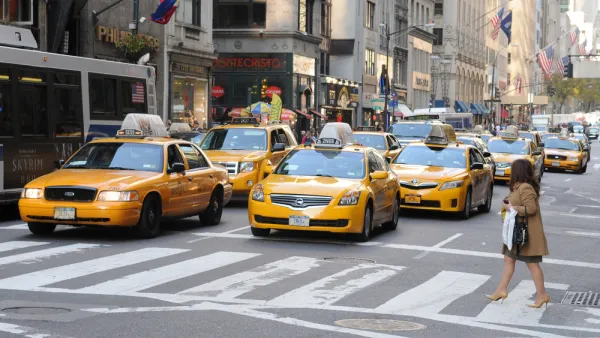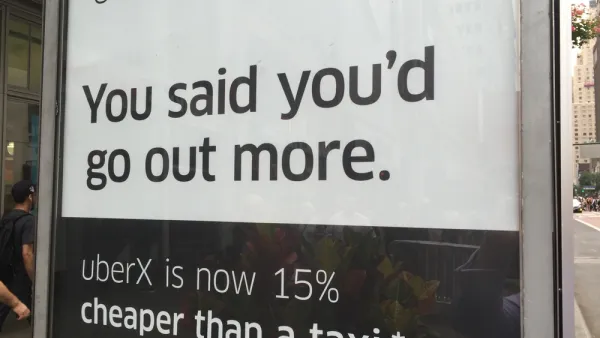The potential risks of privatizing mobility are scrutinized in a Canadian city that subsidizes Uber rides.

"Since last May, more than 25,000 trips have been taken with Uber in a town near Toronto, Ontario called Innisfil," reports Tracey Lindeman. "That number, provided to Motherboard by the town, is particularly significant because Innisfil only had around 36,000 residents in 2016."
The town of Innisfil is one of a few in North America that subsidizes ride-hailing trips—in this case to substitute for public transit. Other cities in British Columbia, where ride-hailing companies are illegal, are hoping to follow Innisfil's lead in subsidizing Uber and Lyft rides.
As Lindeman notes, however, "[h]aving a private technology company step in to provide essential services normally offered—and paid for—by governments is a potentially worrisome trend." The main concern Lindeman expresses is a concern that riders would be trapped in a number of scenarios, like the company suddenly goes out of business or raises prices dramatically.
Paul Pentikainen, Innisfil’s senior policy planner, is on the record in the article claiming that the service is cheaper for the city than paying for bus service, but Uber won't say whether the program is profitable for the company. That's not the only reason to approach the long-term sustainability of this program with skepticism. Lindeman rightly points out many of the possible ways programs like Innisfil's could go wrong for residents.
FULL STORY: Uber Says Small Town Public Transit Partnerships Are 'Critical' to Its Success

National Parks Layoffs Will Cause Communities to Lose Billions
Thousands of essential park workers were laid off this week, just before the busy spring break season.

Retro-silient?: America’s First “Eco-burb,” The Woodlands Turns 50
A master-planned community north of Houston offers lessons on green infrastructure and resilient design, but falls short of its founder’s lofty affordability and walkability goals.

Delivering for America Plan Will Downgrade Mail Service in at Least 49.5 Percent of Zip Codes
Republican and Democrat lawmakers criticize the plan for its disproportionate negative impact on rural communities.

Test News Post 1
This is a summary

Test News Headline 46
Test for the image on the front page.

Balancing Bombs and Butterflies: How the National Guard Protects a Rare Species
The National Guard at Fort Indiantown Gap uses GIS technology and land management strategies to balance military training with conservation efforts, ensuring the survival of the rare eastern regal fritillary butterfly.
Urban Design for Planners 1: Software Tools
This six-course series explores essential urban design concepts using open source software and equips planners with the tools they need to participate fully in the urban design process.
Planning for Universal Design
Learn the tools for implementing Universal Design in planning regulations.
EMC Planning Group, Inc.
Planetizen
Planetizen
Mpact (formerly Rail~Volution)
Great Falls Development Authority, Inc.
HUDs Office of Policy Development and Research
NYU Wagner Graduate School of Public Service





























